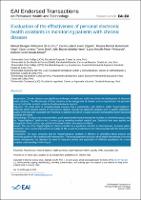| dc.contributor.author | Villanueva De La Cruz, Manuel Benigno | |
| dc.contributor.author | Lévano Zegarra, Cecilia Isabel | |
| dc.contributor.author | Bustamante Vega, Roxana Maribel | |
| dc.contributor.author | Torres Sime, Cesar Lorenzo | |
| dc.contributor.author | Saldaña Narro, Julio Brayan | |
| dc.contributor.author | Ferrer-Peñaranda, Lucio-Arnulfo | |
| dc.contributor.author | Dávila-Morán, Roberto Carlos | |
| dc.date.accessioned | 2023-11-30T15:20:25Z | |
| dc.date.available | 2023-11-30T15:20:25Z | |
| dc.date.issued | 2023 | |
| dc.identifier.uri | https://hdl.handle.net/20.500.13067/2827 | |
| dc.description.abstract | Introduction: Chronic diseases pose significant challenges in healthcare, which has driven the development of electronic health solutions. The effectiveness of these solutions in the management of diseases such as hypertension has generated interest, but further in-depth, evidence-based evaluation is required.Objective: The study aims to comprehensively evaluate how a customizable web platform, called "HyperVigilance", influences blood pressure control in hypertensive patients, considering additional variables such as patient satisfaction, quality of life and costs associated with treatment. In addition, the aim is to explore possible demographic factors that could moderate the results.Methodology: The study was conducted with a quasi-experimental research design that included an intervention group using the "HyperVigilance" platform and a control group receiving standard medical care. Statistical tests were applied and demographic factors such as age, gender and socioeconomic status were considered.Results: The use of the "HyperVigilance" platform resulted in a significant reduction in blood pressure, increased patient satisfaction and a marked improvement in quality of life, as well as a reduction in the costs associated with the treatment of hypertension.Conclusions: The study concludes that the "HyperVigilance" platform is effective in controlling blood pressure and improving quality of life in patients with hypertension. The results support the growing role of digital interventions in chronic disease management, but highlight the need for long-term studies andexploration of different populations for a more complete understanding of their impact. | es_PE |
| dc.format | application/pdf | es_PE |
| dc.language.iso | eng | es_PE |
| dc.publisher | EAI Endorsed Transactions on Pervasive Health and Technology | es_PE |
| dc.rights | info:eu-repo/semantics/openAccess | es_PE |
| dc.rights.uri | https://creativecommons.org/licenses/by-nc-sa/4.0/ | es_PE |
| dc.subject | Hypertension | es_PE |
| dc.subject | Personal electronic health assistants | es_PE |
| dc.subject | HyperVigilance Platform | es_PE |
| dc.subject | Quality of life | es_PE |
| dc.subject | Associated costs | es_PE |
| dc.title | Evaluation of the effectiveness of personal electronic health assistants in monitoring patients with chronic diseases | es_PE |
| dc.type | info:eu-repo/semantics/article | es_PE |
| dc.identifier.journal | EAI Endorsed Transactions on Pervasive Health and Technology | es_PE |
| dc.identifier.doi | https://doi.org/10.4108/eetpht.9.4215 | |
| dc.subject.ocde | https://purl.org/pe-repo/ocde/ford#5.02.04 | es_PE |


